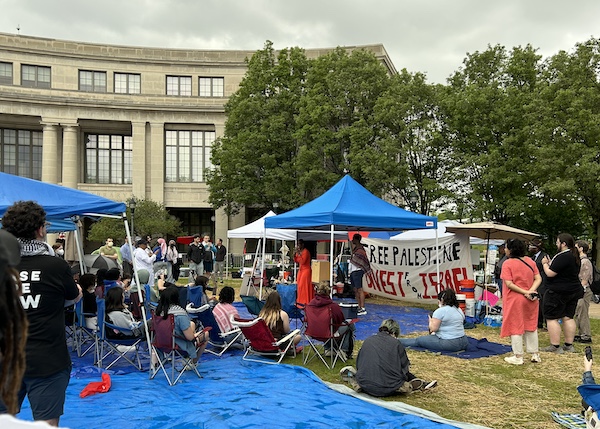Ohio Attorney General Dave Yost. (Photo by Justin Merriman/Getty Images) May 4, 2024, CLEVELAND, OH — Former state Sen, tNina Turner speaks to attendees at teach-in at protest encampment on campus of Case Western Reserve University. [PHOTO | R.T. Andrews for The Real Deal Press]
Ohio Attorney General Dave Yost sent a letter Monday to Ohio university presidents saying recent protesters who were arrested may have committed a felony by wearing a mask.
A 1953 Ohio law says it is a felony to commit a crime — even a misdemeanor — with two or more people “while wearing white caps, masks, or other disguise,” according to Ohio Revised Code 3761.12. Several states passed anti-masking laws in the mid-20th century in response to violence by the Ku Klux Klan, according to the Southern Poverty Law Center.
About 15 states have anti-mask laws still on the books, according to the Free Speech Center at East Tennessee State University.
“There are few more significant career-wreckers than a felony charge,” Yost wrote in his letter to university presidents. “I write to inform your student bodies of an Ohio law that, in the context of some behavior during the recent pro-Palestinian protests, could have that effect.”
Ohio universities and colleges have recently been the site of protests over the Israel-Hamas war in Gaza, and 41 people — including college students — were arrested at various protests at Ohio State University at the end of April. Some protesters wore surgical masks that became common during the COVID-19 pandemic and others wore black-and-white checkered keffiyehs as face coverings.

Protesters who were arrested were charged with criminal trespassing, a fourth-degree misdemeanor punishable by up to 30 days in jail or a $250 fine.
Violating the “anti-disguise” law is a fourth-degree felony punishable by between six and 18 months of imprisonment, up to $5,000 in fines and five years of community control, Yost wrote in his letter.
“This punishment is significantly greater than misdemeanors that typically follow minor infractions that accompany student protests,” Yost wrote in his letter.
He went on to say he does not want people to be surprised they broke the law.
“In the first place, students should protest within the bounds of the law, and not commit crimes. In the second place, they should own their advocacy and avoid wearing masks,” Yost wrote in his letter. “It seems likely that at least some of the students around Ohio are unaware of this law, or the risk of their conduct.”
State Sen. Bill DeMora, D-Columbus, condemned Yost’s letter.
“It is disgusting that the Attorney General is trying to intimidate students into believing that they could be charged with a felony, citing a law that was specifically written to go after the KKK,” DeMora said in a statement. “His thinly-veiled efforts to encourage law enforcement to charge student activists with felonies is a pigheaded, blatant misread of the law.”
• • •• • •
This story is provided by Ohio Capital Journal, a part of States Newsroom, a national 501(c)(3) nonprofit. See the original story here.














